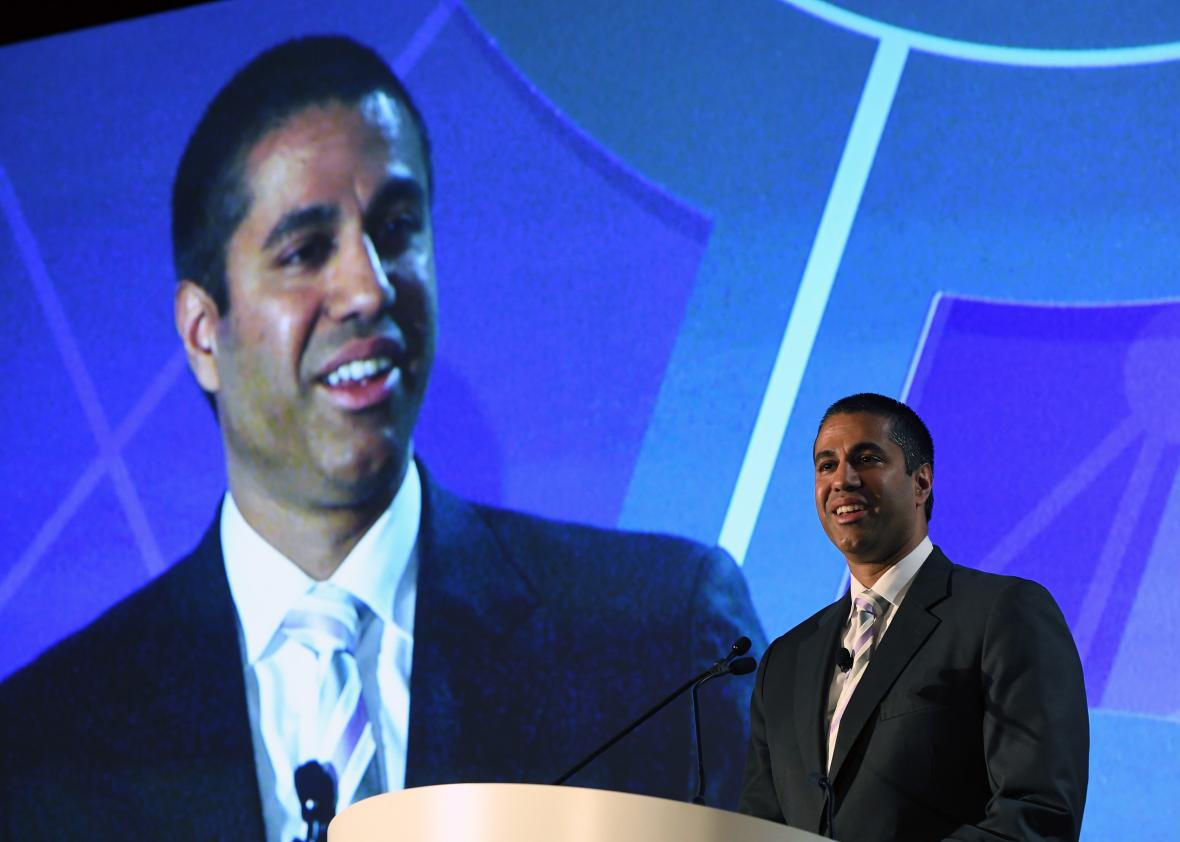
Ethan Miller/Getty Images
Ajit Pai, the Trump-appointed chairman of the Federal Communications Commission, suggested in a speech Tuesday that the actions of companies like Twitter are the real threats to the open internet—not the removal of network neutrality protections—and the alt-right was thrilled to hear it.
Last week, Pai unveiled his official plan to repeal the network neutrality rules that were passed in 2015, and if all goes to plan, internet providers will be able to collect money from websites to reach users faster by as early January 2018, a move that will likely result in a tiered internet where large corporations can afford advantages over their smaller competitors. This week, he’s been making his case in public.
“When it comes to an open Internet, Twitter is part of the problem,” Pai said at an event at R Street Institute, a libertarian-leaning think tank. “The company has a viewpoint and uses that viewpoint to discriminate.” Pai offered as an example Twitter’s fumble when it (temporarily) took down and an offensive ad from Rep. Marsha Blackburn, a Tennessee Republican currently running for Senate. He went on: “And to say the least, the company appears to have a double standard when it comes to suspending or deverifying conservative users’ accounts as opposed to those of liberal users. This conduct is many things, but it isn’t fighting for an open Internet.”
The FCC chairman, the child of Indian immigrants who has been the subject of racist commentary from people engaging in the net-neutrality debate, was likely referring to Twitter’s recent deverification of a handful of famous racists and anti-Muslim activists, including the white nationalist Richard Spencer; Jason Kessler, the organizer of the Unite the Right rally in Charlottesville, Virginia; and alt-right activist Laura Loomer, who was recently kicked off of Uber and Lyft because of her anti-Muslim tweets. Two weeks ago, they all lost their verified status on Twitter, a designation that elevated their tweets within searches on the network and on Google. What’s weird about Pai’s comments is that while these are all figures on the right, conservatives don’t typically count them among their ranks. And while conservatives do sometimes cast themselves as ideological victims of Silicon Valley’s overreach, there have been no recent deverifications of prominent right-wing figures, “conservative” or otherwise, not known for promoting hate. In other words, according to Pai, the demotion of racists on a social network is a bigger deal than an action that could radically change the architecture of—and who succeeds on—the internet.
How so? Websites and social media platforms, Pai continued, “are a much bigger actual threat to an open internet than broadband providers, especially when it comes to discrimination on the basis of viewpoint.” The problem with this formulation, however, is that when a website or a platform decides to take a stand against hate speech, it is not stopping those people from creating a website of their own to promote their views. They’re private companies—ones that are generally permissive when it comes to any speech not associated with violent persecution—and they can do with their platforms what they want.
It’s true, of course, that Facebook, Google, and Twitter are all pretty much essential to anyone trying to push a personal brand or issue online, and the way these companies wield their power can make or break a campaign. They have concentrated their power to the point that the industry may very well be in need of trustbusting. But their inconsistent policing of hate speech isn’t what’s central to that debate, and equal access to any one website or platform isn’t the same thing as equal access to the internet writ large. Besides, if there’s any hope for tackling the power of these titans, it’s probably going to be a lot harder if the repeal of net neutrality allows them to dominate their categories even more than they already do.
So Pai didn’t succeed at making a novel counterargument about what ails the open internet. What he did do, however, was endear himself to a far-right that has at times been of two minds on his recent net neutrality actions. For months, the alt-right has argued that it is subject to unfair discrimination by tech platforms. Where most of us applaud them when they tamp down on hate speech, the alt-right has cried ”free speech!” No surprise: Pai’s comments on Tuesday were embraced by users of the alt-right-friendly social network Gab, where people are generally free to be as racist or anti-Semitic as they’d like without fear of being reprimanded or censored.
“One of the best days ever. Only going to get better,” wrote Gab founder Andrew Torba over a link to Breitbart’s coverage of the speech. Sharing another link from the conservative Washington Examiner, Torba wrote, “We swung the entire narrative on this topic folks. Making history here!”
“FCC Chairman Ajit Pai calls out Twitter and other leftist Silicon Valley companies for supporting net neutrality while being the biggest censors in the world…. E A T S H I T F A G G O T S,” wrote Matt Forney, a verified Gab user who also hosts a radio show. That talking point took additional hold on the alt-right beginning in August, when numerous social media accounts and websites run by white nationalists and neo-Nazis started to get booted off social media sites, platforms, and internet services—everything from CloudFlare to Airbnb to Facebook to OkCupid—following the violent Charlottesville rally. That wave of shutdowns inspired a handful of alt-right adherents to start working building their own versions of internet services that don’t ban hate speech.
Though Pai’s plans to shelve net neutrality would cement the internet oligopoly they profess to detest, many in the alt-right have embraced the FCC chairman’s moves, which the president supports. Now it seems that Pai, inadvertantly or not, is embracing the alt-right, too.